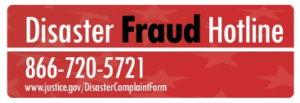Predatory businesses and scammers prey on the public during the pandemic even as vaccines arrive in California
According to the U.S. Department of Health and Human Services (HHS), predatory business practices are not going away even during one of the largest public health emergencies in modern history. Officials at the federal, state and local levels are encouraging Californians to be leery of cold calls, suspicious offers for fraudulent COVID-19 tests, grants or other services.
The public can report such suspicious activity to the U.S. Department of Justice National Center for Disaster Fraud, HHS or the Federal Trade Commission (see links below).
Scammers are using telemarketing calls, text messages, social media platforms, door-to-door visits and many other tactics to commit COVID-19-related scams. Fraudsters are offering COVID-19 tests, HHS grants and Medicare prescription cards in exchange for personal details, including Medicare information. These services are illegal.
Criminals leverage the emergency nature of the COVID-19 pandemic to benefit themselves, and beneficiaries face potential harm. Personal information collected by criminals can be used to fraudulently bill federal health care programs and commit medical identity theft.
The State of California continues its efforts to stop the spread of COVID-19 through contact tracing, increased testing and collaboratively distributing the vaccine with the assistance of the federal government and private sector.
Reminder: Contact tracers will never ask you for your social security number, immigration status, credit card number, bank account or billing information.
As vaccine delivery begins, you will not be asked for money to enhance your position for vaccine eligibility. You will not be asked for personal information to secure a vaccination.
Tips on How to Protect Yourself (via HHS)
- Be vigilant and protect yourself from potential fraud concerning COVID-19 vaccines. You will not be asked for money to enhance your ranking for vaccine eligibility. Government and State officials will not call you to obtain personal information in order to receive the vaccine, and you will not be solicited door-to-door to receive the vaccine.
- Beneficiaries should be cautious of unsolicited requests for their personal, medical, and financial information. Medicare will not call beneficiaries to offer COVID-19 related products, services, or benefit review.
- Be suspicious of any unexpected calls or visitors offering COVID-19 tests or supplies. If you receive a suspicious call, hang up immediately.
- Do not respond to, or open hyperlinks in, text messages about COVID-19 from unknown individuals.
- Ignore offers or advertisements for COVID-19 testing or treatments on social media sites. If you make an appointment for a COVID-19 test online, make sure the location is an official testing site.
- Do not give your personal or financial information to anyone claiming to offer HHS grants related to COVID-19.
- Be aware of scammers pretending to be COVID-19 contact tracers. Legitimate contact tracers will never ask for your Medicare number, financial information, or attempt to set up a COVID-19 test for you and collect payment information for the test.
- If you suspect COVID-19 health care fraud, report it immediately online or call 800-HHS-TIPS (800-447-8477).

Video:
Resource Links:
https://oig.hhs.gov/coronavirus/fraud-alert-covid19.asp
https://www.justice.gov/coronavirus/combattingfraud
https://www.ftc.gov/coronavirus/scams-consumer-advice
Report:
https://reportfraud.ftc.gov/#/
Department of Justice, National Center for Disaster Fraud (NCDF)
Baton Rouge, LA, 70821-4909
Call the Disaster Fraud Hotline at 866.720.5721
Fax the Disaster Fraud Hotline at 225.334.4707
